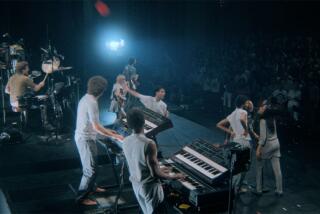Grammys Saluted in Treasure Trove of Films
- Share via
To celebrate the return of the Grammy Awards to the Shrine Auditorium in Los Angeles on Feb. 24, the American Cinematheque will present “Sound and Vision: Hollywood Salutes the Grammys,” one of the Cinematheque’s largest and most appealing offerings ever.
The films will screen at the Directors Guild Thursday through Feb. 23. Curators Dennis Bartok and Charles Lippincott have gathered a rich mix of the rare and the brand-new, their only requirement that each film have some connection with music.
Among the treats in this treasure trove is the 8 p.m. opening night attraction, Robert Rodriguez’s sly and hilarious “El Mariachi,” which stars Carlos Gallardo in the title role as an itinerant musician who happens into a Mexican border town only to be mistaken for a hit man who carries his weapons in a guitar case virtually identical to the mariachi’s. The film is a sensational debut for its 24-year-old Austin, Tex., maker.
Friday brings two more premieres: Arthur Elgort’s “Texas Tenor: The Illinois Jacquet Story” (at 7 p.m.) and Francois Bergeron’s “Apocalypse Across the Sky” (at 9:15 p.m.) The first is a warm, thoughtful and leisurely study of Illinois Jacquet, the legendary, influential tenor saxman who continues to tour with a big band at age 70, something that Jacquet says requires both “experience and stamina.” A handsome, unpretentious professional, Jacquet is vigorous in performance, and offstage, as mellow as his music. Jazz pianist Dorothy Donegan, herself a legend, remarks of Jacquet, “He’s so great they named a state after him.”
The second film celebrates the insistent, alternately plaintive and pounding music that has been played since antiquity in Jajouka, a small mountain village in Morocco. The music of the Jajoukan masters involves beliefs in magic, and Bergeron’s film, which includes commentary by Paul Bowles and William Burroughs, takes on an exotic, mystical quality itself.
More local premieres continue Saturday with Emma Jones Morris’ “Something Within Me” (at 6 p.m.) and Steve Gomar’s “Fly by Night” (at 8 p.m.). Morris’ film is about as irresistible as documentaries get: an account of how an intense program in the performing arts not only saved a South Bronx parochial school from closure due to declining enrollment but also vastly improved its students’ reading and math skills. In this oasis amid a neighborhood wracked with drug-dealers, selfless teachers and bright, lively pupils persist.
“Fly by Night” offers the familiar story of an ambitious young man who achieves success with his musical group only to see it begin coming apart, causing him to question his values. Frequently awkward and amateurish and downright preachy and elementary, it is helped immensely by the fact that the music at hand is rap and its star is charismatic, solidly professional Jeffrey Sams.
In her “High Lonesome: The Story of Bluegrass Music” (Sunday at 2:45 p.m.) Rachel Liebling has done a remarkable job in tracing all the influences that shaped bluegrass music, which first flowered during the Depression. This documentary is preceded at noon by a two-hour survey of the kings and queens of country music. For information: (213) 466-FILM.
Among the films to be presented this week in UCLA’s Michelangelo Antonioni retrospective are four major works: “La Notte” (1961) and “The Eclipse” (1962), Tuesday at 8 p.m., and “Red Desert” (1964) and “Blow-Up” (1965), screening Saturday at 7:30 p.m.
Except for “The Patsy” and “Show People,” both directed by King Vidor in 1928, Marion Davies’ other silents are virtually unseen, but the Silent Movie has managed to secure a print of her 1923 “Lights of Old New York,” which screens Friday and Saturday at 8 p.m. Wednesday’s double feature is the heady original vamp movie, “A Fool There Was” (1915) with Theda Bara, and a Clara Bow rarity, “My Lady of Whims” (1925). Information: (213) 653-2389.
More to Read
The biggest entertainment stories
Get our big stories about Hollywood, film, television, music, arts, culture and more right in your inbox as soon as they publish.
You may occasionally receive promotional content from the Los Angeles Times.










